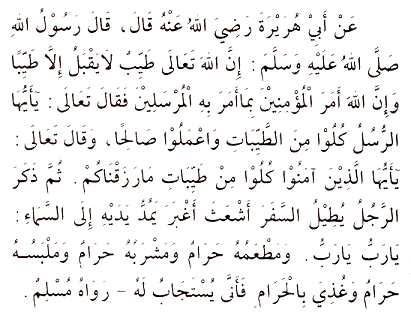The term “halal” can be a controversial and often misunderstood topic in secular and non-muslim countries. In fact even practicing Muslims sometimes don’t understand what the term halal means.
What does halal and at – tayyib mean?
Halal is an Arabic word that simply means lawful or permitted, but generally refers to what’s allowed under Islamic law. It’s the opposite of harām, which means unlawful or prohibited. Some things are very clear-cut halāl or harām, however, as with a lot of religious law, other things can be open to interpretation.
Abu Hurairah, radiyallahu ‘anhu, reported that the Messenger of Allah, sallallahu ‘alayhi wasallam, said:
“Verily Allah the Exalted is pure. He does not accept but that which is pure. Allah commands the believers with what He commanded the Messengers. Allah the Almighty has said: “O you Messengers! Eat of the good things and act righteously” [23:51-53]. And Allah the Almighty also said: “O you who believe! Eat of the good things that We have provided you with” [2:167-172].
Then he (the Prophet) mentioned (the case of) the man who, having journeyed far, is dishevelled and dusty and who stretches out his hands to the sky (saying): “O Lord! O Lord!” (while) his food was unlawful, his drink was unlawful, his clothing was unlawful, and he is nourished with unlawful things, so how can he be answered?”

The word “at-tayyib” is used in the Qur’an and Sunnah to describe actions, good deeds, people, things, speech, etc. This term is used as adjectives. Literally it means something good. Ibn Rajab interpreted the word as “at-tahir”, or pure.
The term “Verily Allah the Exalted is pure” means Allah has all the attributes of perfection and completeness, free from any kind of shortcomings, weaknesses or needs.
As for “He does not accept but that which is pure”, the hadith refers to all good deeds. Allah does not accept any deeds that are spoilt by any aspects that may ruin it. For example, the deed must be free from showing-off to others and in the case that involves wealth then the wealth must come from legal sources.
Allah commanded the Believers (Mu’minin) in the same manner as He commanded the Messengers:
“O Messengers! Eat of the Tayyibat” [Surah Al-Mu’minun (23): ayat 51]
“O you who believe! Eat of the Tayyibat that We have provided you with, ..” [Surah Al-Baqarah (2): ayat 172]
The verses above and this hadith imply the following:
- The money that the Muslims earn must be pure and legal.
- The food that is consumed must be lawful (halal).
- The money with which a person buys food must be lawful, coming from lawful sources
- Whether something is permissible or prohibited is by the will of Allah. He explains, guides and tells us what are permissible and what are not. It is actually Allah’s right to make things lawful and unlawful.
- Earning and consuming lawful things are important conditions for acceptance of our supplications (Doa) by Allah.
- Earning and consuming lawful things.
